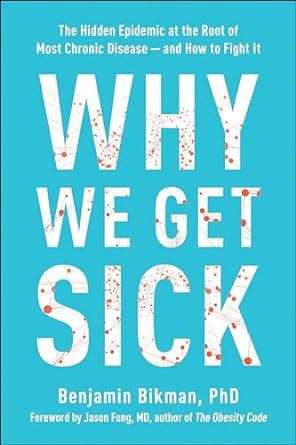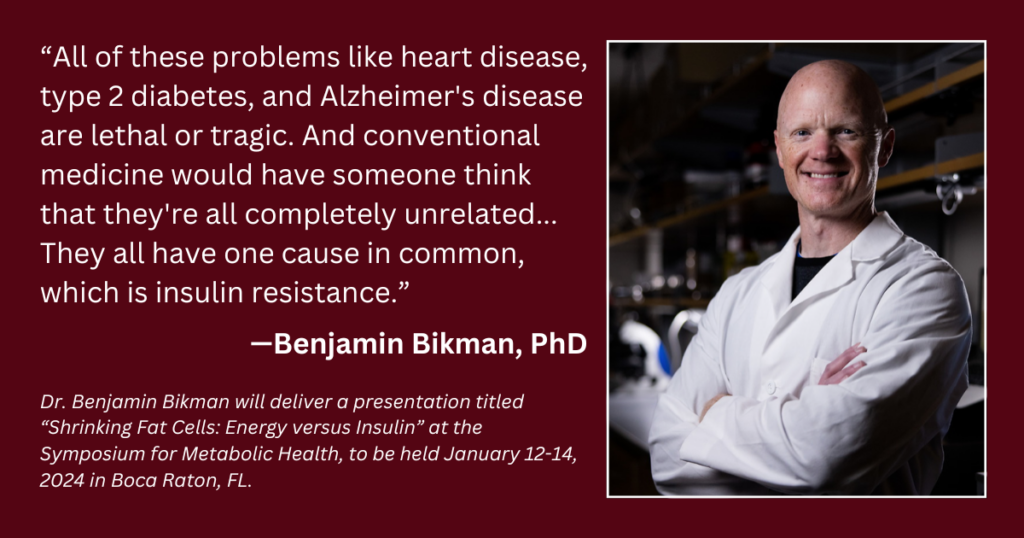“Why We Get Sick” author to discuss why fat matters and what to do about it
We recently had the opportunity to speak with Dr. Benjamin Bikman, a distinguished expert in the field of metabolic health. Dr. Bikman is set to present at the 8th Annual Symposium for Metabolic Health in Boca Raton, Florida, taking place from January 12-14, 2024.
Dr. Bikmans’s contribution to this field is grounded in a deep understanding of the molecular dynamics that disrupt normal metabolic processes, leading to disorders such as obesity, type 2 diabetes, and dementia.
With an academic background that includes a Ph.D. in bioenergetics and a postdoctoral fellowship at the Duke-National University of Singapore in metabolic disorders, Dr. Bikman has been at the forefront of research exploring the pivotal roles of insulin and ketones in metabolic health. His work, frequently featured in respected peer-reviewed journals and international science conferences, sheds light on the intricate mechanisms underpinning a wide range of metabolic diseases.
Notably, Dr. Bikman is also the author of Why We Get Sick: The Hidden Epidemic at the Root of Most Chronic Disease–and How to Fight It, a groundbreaking book that explores the widespread issue of insulin resistance and its connection to various chronic illnesses.
His upcoming presentation at the Boca Symposium promises to offer insightful perspectives on metabolic health, with a specific emphasis on managing fat cells, the critical role of insulin resistance, and much more. During our conversation with Dr. Bikman, he shared valuable insights into the topics he plans to cover.
Why fat matters and what to do about it
Dr. Bikman’s presentation, titled “Shrinking Fat Cells: Energy versus Insulin,” will explore the intricacies of managing fat cells and the role of insulin resistance in chronic diseases. A central theme of his talk is the idea that the path to insulin resistance begins in the fat cells themselves. When these cells undergo hypertrophy, they become insulin resistant and pro-inflammatory, leading to a spread of insulin resistance throughout the body.
Dr. Bikman plans to address the complexities of attempting to shrink fat cells , emphasizing the role of energy in the process. He acknowledges the importance of calories but cautions against focusing solely on caloric reduction. He explains the necessity of both elevated insulin and sufficient caloric intake for fat cell growth. If one only reduces calorie intake without addressing high insulin levels, it can lead to an energy deficit in the blood, triggering hunger and making diet adherence challenging.
“If we fail to address high insulin, you will pit yourself against hunger, because the brain is starting to sense the reduced energy available in the blood. And it will tell you to eat, eat, eat, eat, and eventually you’ll break,” said Dr.Bikman. “So the best first step for shrinking a fat cell is to reduce insulin. Ignore the calories, and then as you reduce insulin by controlling carbs, prioritizing protein and not fearing fat, now you will increase metabolic rate, you will increase your mitochondrial density, you will start using your own fat for fuel, and be shrinking fat cells.”
Why We Get Sick
 Dr. Ben Bikman’s book, Why We Get Sick, presents a compelling narrative about the pervasive issue of insulin resistance and its link to many major diseases. Drawing on his extensive research as a pathophysiology professor and scientist, Dr. Bikman explores the connection between insulin resistance and a range of serious health conditions, including cancer, diabetes, Alzheimer’s disease, and heart disease. The book emphasizes a worrying statistic: over half of all adults in the United States suffer from insulin resistance, a figure that is similarly high or worse in many other countries. This condition is not just a health issue but a common denominator underlying various chronic diseases.
Dr. Ben Bikman’s book, Why We Get Sick, presents a compelling narrative about the pervasive issue of insulin resistance and its link to many major diseases. Drawing on his extensive research as a pathophysiology professor and scientist, Dr. Bikman explores the connection between insulin resistance and a range of serious health conditions, including cancer, diabetes, Alzheimer’s disease, and heart disease. The book emphasizes a worrying statistic: over half of all adults in the United States suffer from insulin resistance, a figure that is similarly high or worse in many other countries. This condition is not just a health issue but a common denominator underlying various chronic diseases.
In Why We Get Sick, Dr. Bikman provides not just an explanation of the problem but also offers practical solutions. He presents an evidence-based plan to reverse and prevent insulin resistance, including helpful food lists, meal suggestions, easy exercise principles, and more. His approach is unique in that it focuses on lifestyle changes over medication.
Bikman explained that his motivation for writing the book stemmed from a desire to make his scientific findings accessible to the general public. “This is a problem that is very, very responsive to lifestyle and what and how we eat,” he said. “What we eat becomes either the culprit or the cure. It is either causing disease or it is curing the disease when it comes to these cardiometabolic problems.”
The book is structured into three parts: understanding what insulin resistance is and why it matters; identifying its causes; and learning what can be done about it.
Enthusiasm for 2024 Boca Symposium
Dr. Bikman explained that he holds the Symposium for Metabolic Health Conferences in high regard, and his reasons for this are both profound and personal. He approaches speaking engagements with a unique seriousness, selecting his appearances carefully. Dr. Bikman explained, “I don’t like giving the same talk again and again. And I take enormous pride in creating a talk that has a very distinct, not only aesthetic, but also a clear message that I think is going to be novel.”
He acknowledges the challenge and time commitment required to develop these distinctive talks. He admires the work of LowCarbUSA®’s Doug Reynolds and Pam Devine, stating, “I like what they have put together so much that I really want to try to keep going to as many of these conferences as possible.”
He expressed his enjoyment of the Boca Symposium, emphasizing the high caliber of the speaker lineup, the engaging location, the quality of discussions, and the strong interest of the attendees. “I find it gratifying to shake hands, smile with, and talk with people who are there to really learn,” he said.
Reasons for Optimism
Dr. Ben Bikman talked more about his outlook on the evolving understanding of diet’s role in health and disease. He said he has an optimism rooted in the changing attitudes of clinicians towards diet and nutrition.
“I am always optimistic,” he said. “Just by nature, I like to choose to be optimistic about the world and events. A growing number of clinicians are starting to embrace the fact that not only does diet matter, but that in fact, in many instances, it is the superior option to drugs. And that is a significant hurdle for a clinician to overcome.”
Dr. Bikman also notes the growing trend of individuals taking proactive steps to improve their health through dietary changes. “Many are learning, often on their own, that lifestyle trumps any drug, when it comes to these chronic diseases, and the sheer number of people that are tired of feeling sick and tired. Based on the advice they get from clinicians, they’re starting to do their own homework. And they’re learning more and more of what works for them. And that invariably leads them to eating better food, controlling carbohydrates, prioritizing protein and not fearing fat.”
Plagues of Prosperity
Dr. Bikman went on to discuss the rise in diseases he terms “plagues of prosperity,” such as heart disease, certain types of cancer, fatty liver disease, sarcopenia, Alzheimer’s disease, infertility, and polycystic ovary syndrome. He highlighted that while these conditions have distinct causes, they often share a common factor: insulin resistance. Dr. Bikman explained, “Every single problem I just mentioned, and many more, are in some part caused by insulin resistance.” He provided examples like hypertension and erectile dysfunction, which can see significant improvements or resolution through enhanced insulin sensitivity. Even in complex diseases like cancer, certain types show a favorable response to dietary changes aimed at improving insulin sensitivity.
Register for the 2024 Boca Symposium
The 2024 Boca Symposium will present an extensive program covering a broad spectrum of metabolic therapy topics. This includes sessions on carbohydrate reduction strategies for, and research in, type 2 diabetes, fatty liver, obesity, cardiovascular disease, neurological disorders, as well as mental health conditions, and so much more, offering groundbreaking insights into contemporary treatment modalities.
In addition to these much anticipated presentations the 2024 Boca Symposium will serve as a critical event for the Type 1 diabetes community, attracting both patients and medical professionals. It features a specially curated workshop for practitioners scheduled for Thursday, January 11th (RSVP required) with a comprehensive day dedicated to type 1 diabetes discussions on Friday, January 12th.
Learn more about the Symposium for Metabolic Health in Boca Raton, FL, January 12-14.


